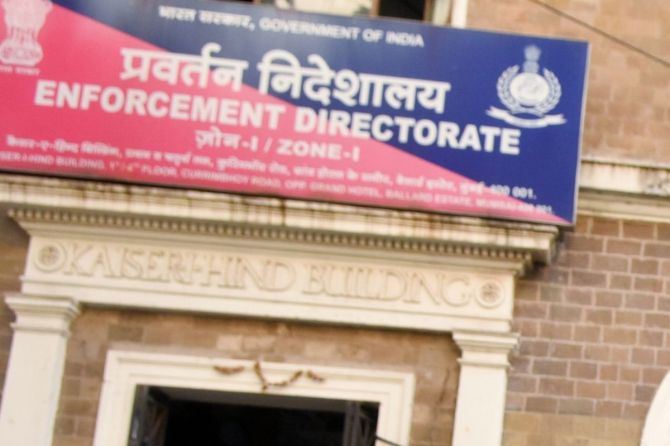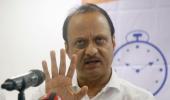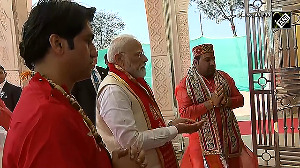'This move rendered the chiefs of important investigative agencies to the status of daily wage earners. It undermined the autonomy and independence of the agencies.'

The final chapter in saga of 'The Importance of Being Sanjay Kumar Mishra' will be complete on July 31 when, following an order from the Supreme Court, the term of the 62-year-old controversial chief of the Enforcement Directorate will come to an end.
Rarely has the apex court ordered that a public servant step down from his position as his continuance in the position was in violation of a court order.
The government, on whose intervention Mishra continued as ED chief, reacted to the court directive with Union Home Minister Amit A Shah tweeting: 'Those rejoicing over the Hon'ble SC decision on the ED case are delusional for various reasons: The amendments to the CVC [Central Vigilance Commission] Act, which were duly passed by Parliament, have been upheld. Powers of the ED to strike at those who are corrupt and on the wrong side of the law remain the same.
'ED is an institution which rises beyond any one individual.... Thus, who the ED director is -- that is not important because whoever assumes this role will take note of the rampant corruption of a cosy club of entitled dynasts who have an anti-development mindset.'
To this, Opposition leader Kapil Sibal had just one question: 'If who the ED Director is is not important, then why did the government give him a third extension?'
Mishra was first appointed the ED director for two years on November 19, 2018.
The government, by an order dated November 13, 2020, modified the appointment letter retrospectively and Mishra's two-year term was changed to three years.
Then, just as he was about to retire, the government, via an ordinance that was later passed by Parliament, amended the CVC Act and the Delhi Special Police Establishment Act to allow extensions of up to five years 'in public interest' to chiefs of the ED and Central Bureau of Investigation.
The extensions would be applicable one year at a time.
Yashovardhan Azad, an Indian Police Service officer for 40 years, told Business Standard: "This move rendered the chiefs of important investigative agencies to the status of daily wage earners. It undermined the autonomy and independence of the agencies. That the ordinance was brought just before a Parliament session meant it was not a move to reform and streamline the functioning of the agencies but designed for particular individuals."
The ordinance came days before the winter session, on November 14, 2021. The urgency was obvious: Mishra's extensions would have come to an end on November 17, 2021.
But non-profit Common Cause was already in court against the extensions.
A fierce argument saw senior advocate Dushyant Dave, appearing for Common Cause, asserting that extension of tenure beyond the retirement age was done because the officer was 'a favourite'.
Solicitor General Tushar Mehta defended the government, saying 'the [appointments] committee went through the performance appraisal reports of the last 10 years of each candidate. For the last 10 years, the report said he was outstanding. Such decisions by the system devised by our country are not by someone's whims and fancies.'
To this, Justice L N Rao observed: 'Even if S K Mishra is excellent, we cannot have him continue till all these cases are over. He is doing good work, but the question is whether his tenure can be extended.'
On September 8, 2021, the court ordered a mandamus -- a command issued by the court to a lower court or government asking (or restraining) an official in his public duties.
Earlier this month, the Supreme Court said the government was free to enact any law it wanted, but it could not violate an action ordered by the court under mandamus.
'This court has specifically issued a mandamus (judgment-directive) that no further extension shall be granted to the second respondent (Kumar). The mandamus issued to the parties (the Centre and Kumar) was binding on them...
'We, therefore, find that the respondent No 1 (Union government) could not have issued orders dated 17th November 2021 and 17th November 2022 in breach of the mandamus issued by this court vide its judgment dated 8th September 2021 in Common Cause (2021).'
However, the court allowed Mishra to continue in his position till July 31. Under the new law, he would have completed his tenure in November.
Mishra is a 1984-batch Indian Revenue Service officer, and believed to be an expert in financial matters.
He has been chief commissioner of Income Tax in Delhi and was declared interim chief of ED following his appointment as Principal Special Director of ED for three months before the retirement of his predecessor, Karnal Singh. He was then elevated as additional secretary.
Originally from Uttar Pradesh, he has personally supervised ED probes in several high-profile cases.
These include money laundering allegations against Maharashtra leader Sharad Pawar's nephew and current Maharashtra Deputy Chief Minister Ajit Pawar; allegations against former UP chief minister and Samajwadi Party chief Akhilesh Yadav in an illegal mining case; the INX media case relating to foreign exchange violations under the Foreign Exchange Management Act ; the allegedly illegal transfer of property in Panchkula by then chief minister Bhupinder Singh Hooda and late party treasurer Motilal Vora; to Associated Journals Limited owned by Sonia Gandhi and Rahul Gandhi and a host of other cases.
The agency has registered, in the last four years, cases against Karnataka Congress chief D K Shivakumar, Jharkhand Chief Minister Hemant Soren, former Maharashtra home minister Anil Deshmukh, former Jammu and Kashmir chief minister Mehbooba Mufti and National Conference leaders Farooq Abdullah and Omar Abdullah.
All eyes now will be on the new incumbent who will follow Mishra in the ED. The government has said in court that it would take time to hire a new chief.
Deep thinking -- and deep selection -- are expected to govern the choice.
Feature Presentation: Aslam Hunani/Rediff.com












 © 2025
© 2025